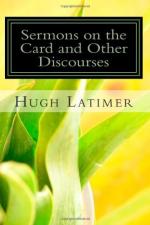Tu quis es? Which words are as much to say in English, “Who art thou?” These be the words of the Pharisees, which were sent by the Jews unto St. John Baptist in the wilderness, to have knowledge of him who he was: which words they spake unto him of an evil intent, thinking that he would have taken on him to be Christ, and so they would have had him done with their good wills, because they knew that he was more carnal, and given to their laws, than Christ indeed should be, as they perceived by their old prophecies; and also, because they marvelled much of his great doctrine, preaching, and baptizing, they were in doubt whether he was Christ or not: wherefore they said unto him, “Who art thou?” Then answered St. John, and confessed that he was not Christ.
Now here is to be noted the great and prudent answer of St. John Baptist unto the Pharisees, that when they required of him who he was, he would not directly answer of himself what he was himself, but he said he was not Christ: by the which saying he thought to put the Jews and Pharisees out of their false opinion and belief towards him, in that they would have had him to exercise the office of Christ; and so declared further unto them of Christ, saying, “He is in the midst of you and amongst you, whom ye know not, whose latchet of his shoe I am not worthy to unloose, or undo.” By this you may perceive that St. John spake much in the laud and praise of Christ his Master, professing himself to be in no wise like unto him. So likewise it shall be necessary unto all men and women of this world, not to ascribe unto themselves any goodness of themselves, but all unto our Lord God, as shall appear hereafter, when this question aforesaid, “Who art thou?” shall be moved unto them: not as the Pharisees did unto St. John, of an evil purpose, but of a good and simple mind, as may appear hereafter.
Now then, according to the preacher’s mind, let every man and woman, of a good and simple mind, contrary to the Pharisees’ intent, ask this question, “Who art thou?” This question must be moved to themselves, what they be of themselves, on this fashion: “What art thou of thy only and natural generation between father and mother, when thou camest into this world? What substance, what virtue, what goodness art thou of, by thyself?” Which question if thou rehearse oftentimes unto thyself, thou shalt well perceive and understand how thou shalt make answer unto it; which must be made on this wise: I am of myself, and by myself, coming from my natural father and mother, the child of the ire and indignation of God, the true inheritor of hell, a lump of sin, and working nothing of myself but all towards hell, except I have better help of another than I have of myself. Now we may see in what state we enter into this world, that we be of ourselves the true and just inheritors of hell, the children of the ire and indignation of Christ, working all towards hell, whereby we deserve of ourselves perpetual damnation, by the right judgment of God, and the true claim of ourselves; which unthrifty state that we be born unto is come unto us for our own deserts, as proveth well this example following:




